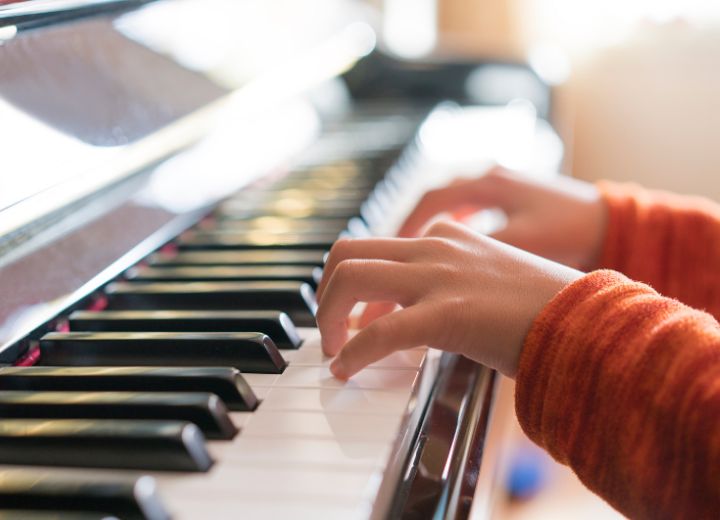Many highly skilled pianists work closely with children from a very young age. Years of experience means they can tailor the lessons to your child’s needs and skill level.
With a tutor, your child has much less chance to become complacent and will maintain regular and consistent practice and progress faster, making it much more likely that they will stay committed in the long term.
Why not look for private piano lessons near me right now?
Essential skills my child will learn from the piano
- Creativity:
Research shows the frontal cortex becomes active while playing an instrument, regardless of whether the piece is played directly from a score or improvised.
- Physical benefit:
Science suggests that pianists typically do not lose as much hearing function as they are older. It is also said to reduce stress.
- Dexterity:
Consistent, autonomous movement of individual fingers makes the hands more swift and accurate and increases hand-eye coordination.
- Cognitive development:
Playing music helps stimulate a child’s brain, creating new neural pathways.
- Academic:
Children who learn an instrument are considered higher achievers in a learning environment.
- Mental health:
Creating music provides peace and tranquility for many people, and piano players seemingly suffer fewer mental health issues than their counterparts.
- Work ethic:
Learning any instrument takes time, patience, and effort, naturally instilling good morals and hard-working standards.
- Social skills:
Learning and eventually being able to play well will allow your child to connect differently with their peers and boost their self-esteem.
- Morals:
A piano is a hefty investment for most people. A child will learn respect for the equipment and the people around them and what they can learn from others who are more skilled (especially when learning via tutor).
What age is best for my child to start playing piano?
The consensus regarding the best age for a child to begin their training is between the ages of five and nine.
However, as with any skill, learning at the earliest possible time will produce the best results, evidenced by countless videos of child prodigies online.
There are many job opportunities out there for the future for those with musical competencies, and these range from classical, such as playing in theaters, to more current endeavors, such as making content on YouTube.
What your child can expect from their first lesson
The first lessons your child takes will involve lots of fun and encouragement, and teachers usually use games involving memory and animals to help introduce them to critical placements and early techniques.
There are also numerous ways your child will learn to strengthen their fingers and use each digit independently, ranging from fun activities involving numbers, letters, and rhymes to active practice on a live piano.
How quickly can I expect skill progression?
Every child is different, so it can be challenging for tutors to create a timeline for improvement.
Having said this, they should be ready to move on to more advanced pieces and techniques after one to three years of practice.
Then at around six to ten years of practice, they should be well on their way to becoming an expert pianist, even composing their pieces.
What you have to look forward to
Among the many benefits we have discussed, you will find yourself inundated with years of beautiful scores of music from your very own living room, and that’s not something everyone gets to enjoy!
Help ensure your little one gets a great start in life with the correct tools. Soon they will be on the right track to becoming a well-rounded character while learning a life skill that will open up many opportunities.

